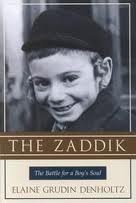 Elaine Denholtz, author of seven non-fiction books, says she worked far longer on her latest book, The Zaddik, than on any previous work because she found the story so riveting and complicated.
Elaine Denholtz, author of seven non-fiction books, says she worked far longer on her latest book, The Zaddik, than on any previous work because she found the story so riveting and complicated.
The New Jersey author spent six years working on the book, which recounts the true story of a 13-year-old boy in New York who was kidnapped by Hasidic Jews in 1992. Denholtz says it was her intense sense of identification with the boy’s mother that compelled her to tell the story of his kidnapping and the eventual court case that generated headlines from the United States to Israel.
“The reason I got so involved in the story is that — and it seems so tragic given what happened on Sept. 11th — it seemed to ask some very important questions, Where does religious devotion end and evil begin? Why do some people who are ultra-religious fundamentalists think they are above the law?”
In essence, The Zaddik recounts the story of Hana Fhima, a single mother with a secular outlook, and her son Shai Fhima, who became drawn towards Jewish Orthodoxy and a charismatic rabbi at a Brooklyn yeshiva. “I see a light in your eyes, come sit by me,” the rabbi reportedly said to Shai, who seemed to undergo a spiritual conversion.
The mother agrees to the rabbi’s and rebbetzin’s kind offer to make the boy a bar-mitzvah, but soon finds herself in a fierce tug-of-war battle for him. Before long, he is spirited away from her.
Drawn into the Hassidic world of religious devotion, black hats and forelock curls, Shai is hidden in a variety of locations in the United States, Canada and France. (Denholtz never discovered his exact whereabouts in Canada.)
To Denholtz, the “fanatical” ultra-Orthodox Jews who kidnapped Shai practiced a form of brain-washing and mind-control on him. “I believe they are cultists, and I will be talking about this when I come to Toronto,” she said.
“They simply felt that they had a right to take this child, and that it was in fact a mitzvah to turn him into a zaddik.” In Jewish theology, a zaddik is a righteous, upright holy man whose influence helps to save the world from sinking into corruption.
Part of the reason the court case proved so challenging is because the district attorneys had political aspirations and did not want to lose the Jewish religious vote in the New York area, Denholtz said.
Eventually the rabbi was imprisoned and the boy was returned to his parents, splitting much of his time between his mother in New York and his father in Israel.
Denholtz says she is naturally attracted to controversial issues. Her last book was Balancing Work and Love, which focused on the situation of Jewish working women. ♦
© 2001






